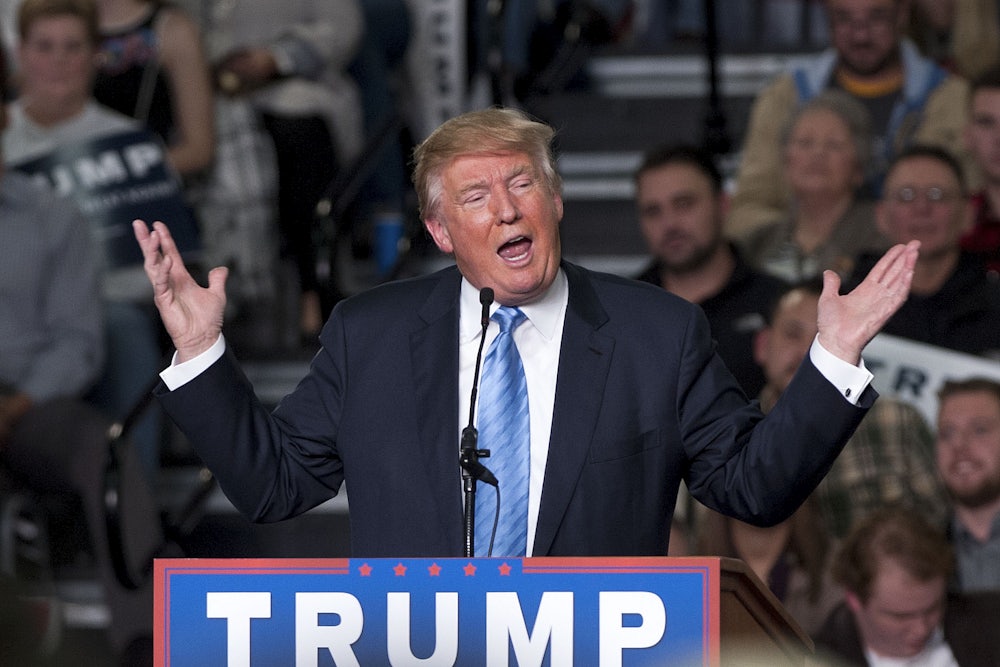The contours of the outsider-as-favorite Republican primary began to take shape this summer, when the candidates without establishment support, led by Donald Trump, consolidated half of the vote in national polls.
The news for GOP elites has grown consistently worse since then. And only now, as those contours stretch far enough to squeeze the establishment entirely out of contention, are the party faithful emerging from their state of Trump denial. They’re beginning to reckon publicly with the calamity of this campaign, and are grasping to reassert control over the process. The only questions now are whether they’re too late, and whether they can defeat Trumpism without acknowledging and atoning for their complicity in his ascent.
A few months ago, Trump and his fellow outsiders were a clear threat to the party, but it took several of them—Trump, Ben Carson, Ted Cruz, Carly Fiorina—to amass 50 percent support, with Trump contributing the lion’s share.
Today, they eclipse it easily. In some early-state polls, Trump and Ted Cruz alone enjoy the support of more than half of all likely voters, while the outsiders combined enjoy the support of more than two thirds of all respondents.
This presents the GOP with a new nightmare scenario. Earlier in the year, Republicans could take solace in the likelihood that the field of elected officials would winnow and that the party would coalesce around a single alternative to the insurgents as it did in 2008 and 2012. They were sure it would come down to a frontrunner against two or three formidable conservative challengers who were splitting the activist vote among themselves.
That winnowing hasn’t happened. And now, if and when it does, it’s conceivable that the combined forces of the party will only be able to marshal about one-third or less of the overall vote—not enough to guarantee victory even if Trump and Cruz battle it out beyond Iowa, New Hampshire, and South Carolina. And even that assumes supporters of candidates like Mike Huckabee and Chris Christie don’t defect to Cruz or Trump instead of Marco Rubio or Jeb Bush.
Whether motivated by this particular analysis or not, party elites are snapping to attention. John Kasich’s SuperPAC is promising a multi-million-dollar anti-Trump blitz. A more concerted effort, spearheaded by GOP operative Liz Mair, is called Trump Card LLC, and operates on the premise that “unless something dramatic and unconventional is done, Trump will be the Republican nominee and Hillary Clinton will become president.”
Prominent surrogates for leading candidates have embraced the notion, first propounded by liberals, that Trump is a “fascist.” But the principals they back won’t go near the term. Some, like Rubio and Cruz, won’t criticize Trump at all, and Cruz in particular is a Trump sycophant—“a big fan.” Which raises the question of whether a party that enables Trump and Trumpism can effectively root out either.
Michael Gerson, a former George W. Bush aide who now writes an opinion column for the Washington Post, acknowledged that “Trump has, so far, set the terms of the primary debate and dragged other candidates in the direction of ethnic and religious exclusion. One effect has been the legitimization of even more extreme views—signaling that it is okay to give voice to sentiments and attitudes that, in previous times, people would have been too embarrassed to share in public.”
With the denial fading, Gerson asks, “Is it possible, and morally permissible, for economic and foreign policy conservatives, and for Republicans motivated by their faith, to share a coalition with the advocates of an increasingly raw and repugnant nativism?”
The answer appears to be “yes.” As much as they want Trump vanquished, the problem for the other Republicans in the field is that they’ve all pledged to back the GOP nominee, no matter who wins. John McCain, a man of the party who nevertheless agreed to place Sarah Palin in line for the presidency, says he will support Trump if faced with a choice between Trump and Hillary Clinton.
That’s not the Breitbart crew talking. It’s the RNC, the entire primary field, and one of the party’s most recent presidential nominees. Which is why when writers like National Review’s Kevin Williamson lay the blame for Trump’s ascent at the feet of conservative movement jesters Ann Coulter and Rush Limbaugh, and shrug that nothing can be done—“as a matter of culture, Trump is—unhappily—right where a great many conservatives are: angry, sputtering, lashing out. Trump may not last; Trumpism will.”—it rings hollow.
As much as they’ve awakened to the threat that Trumpism poses to their party, Republicans and the conservative intelligentsia lack the self-awareness—or perhaps the temerity—to acknowledge that though they now resent it, they’ve been courting it all along.
